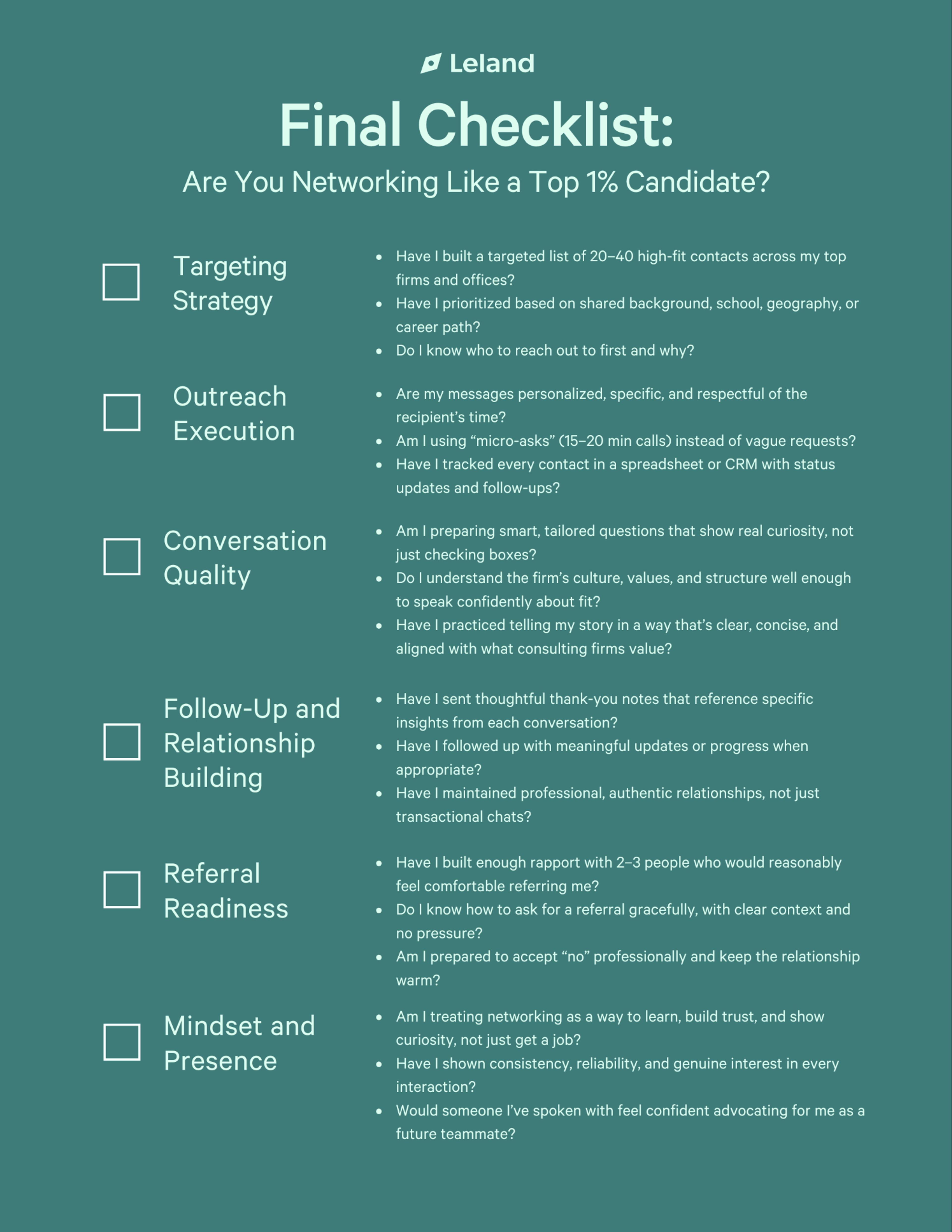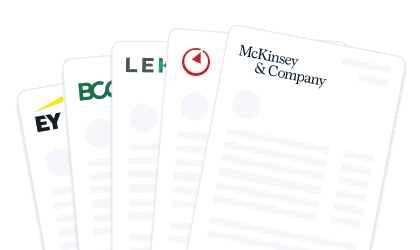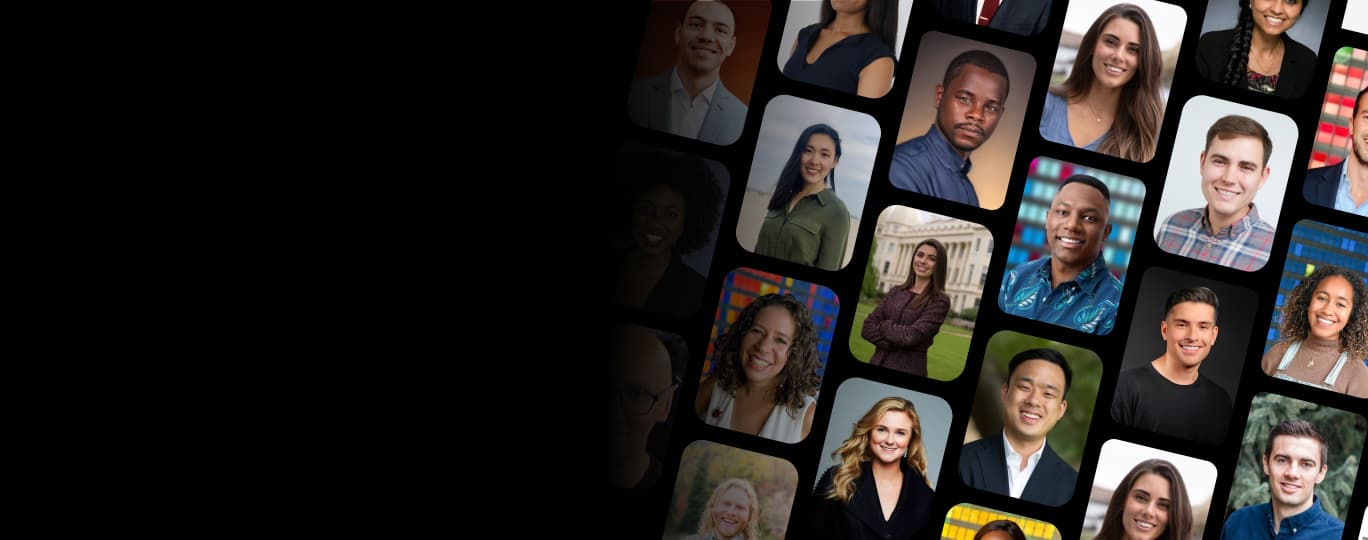Consulting Networking 101: How to Network to Land Offers
Master consulting networking with expert strategies, outreach scripts, and event tips to build real relationships that lead to interviews and offers.
Posted October 7, 2025

Join a free event
Learn from top coaches and industry experts in live, interactive sessions you can join for free.
Table of Contents
If you’re aiming for a top consulting firm like McKinsey, BCG, Bain, or a competitive boutique, networking isn’t optional. It’s one of the most effective ways to stand out in a crowded applicant pool, gain insider knowledge, and significantly enhance your odds during the recruiting process.
But most aspiring consultants approach networking the wrong way. They spray cold messages, ask for referrals too soon, or fail to show genuine interest, and then wonder why no one replies.
This guide will help you master consulting networking the right way: strategically, authentically, and effectively. We’ll cover how to network at recruiting events, online platforms like LinkedIn, and directly with current consultants. We’ll also provide templates, tactics, and expert-backed insights to help in building relationships that support your consulting career goals.
Read: How to Become a Management Consultant: Timeline, Requirements, & Tips
Why Networking Matters in the Consulting Industry
Most top consulting firms receive thousands of applications for a few hundred roles. Even with a strong resume, it’s hard to stand out without a connection inside. That’s where networking comes in. Networking isn’t about asking for a job; it’s about learning, showing initiative, and building trust.
Consultants are more likely to flag your resume, refer you informally, or vouch for your fit if you’ve had an interesting conversation that shows you’re genuinely interested in the role and firm.
Key reasons to begin networking early:
- Gain insider insight into the application and interview processes
- Better understand each firm's culture and expectations
- Get informal referrals or resume pushes
- Learn how to network effectively from those who’ve done it
- Build a professional network that lasts beyond recruiting
Real-world insight: "I didn’t even know what consultants really did until I had 3 coffee chats with associates at different firms. Those convos gave me the clarity I needed to tailor my story."
How Consulting Networking Works: The Consulting Networking Funnel
Think of management consulting networking like a funnel: You start with multiple potential contacts, filter down based on response and rapport, and deepen a few connections over time.
| Stage | Goal | Key Actions | Expert Insight |
|---|---|---|---|
| 1. Research | Build a strategic networking list aligned to your target firms, goals, and background fit | Start by identifying 20 to 40 relevant contacts across your target firms, offices, or alumni networks. Prioritize individuals with shared backgrounds, such as your university, region, or career path. Research their role, career progression, and any mutual connections. | Focus on people who are more likely to respond, not just those with impressive titles. Shared experience often builds trust faster than prestige alone. |
| 2. Outreach | Make a strong, personalized first impression and secure a conversation | Craft tailored connection requests or emails that highlight your genuine interest in the person’s path and the firm. Mention specific details you found compelling in their background. Space out your outreach so you can manage responses and follow-ups thoughtfully. | Use a clear and respectful “micro-ask,” such as requesting a 15-minute call to learn more. Leading with curiosity builds trust and makes the ask feel natural. |
| 3. Engagement | Build authentic rapport and gather valuable insight about the firm, culture, and recruiting | Prepare thoughtful, open-ended questions based on your research. During the conversation, focus on listening, being present, and asking about their experiences and perspective. Share your story briefly, but center the discussion around it. | Be conversational, not transactional. Most consultants are more willing to help when they feel heard, not pitched. |
| 4. Follow-up | Reinforce the connection, stay top-of-mind, and explore opportunities for continued support | Send a personalized thank-you message within 24 hours that reflects something specific they shared. Stay in touch over time with meaningful updates about your journey. If you’ve built rapport and the timing is right, politely ask if they’d consider referring you. | A thoughtful follow-up can turn a one-time chat into a real advocate. Make sure you maintain professionalism and gratitude, regardless of the outcome. |
| 5. Deepen (optional) | Cultivate a long-term professional relationship beyond the immediate application process | Keep them updated on your progress even after recruiting ends. If appropriate, ask if they can connect you with others in their network. Look for ways to reciprocate, such as sharing helpful articles, offering feedback, or simply staying in touch. | Great networking isn’t about one recruiting cycle—it’s about building a network that supports your career for years to come. |
Pro Tip from MBB Coach: “Most candidates make networking transactional. But consultants are trained to evaluate people quickly. If you show curiosity, do your homework, and stay professional, you'll leave a lasting impression, even if you're early in your journey.”
Where to Start: Finding the Right People to Network With
Effective networking in consulting starts with reaching out to the right people, those who are most likely to respond, most relevant to your goals, and best positioned to help you understand the firm and the recruiting process.
Who Should You Reach Out To?
Focus first on people who can relate to your background or guide your specific recruiting path:
- Current consultants at your target office, ideally 1–4 years into their role. They remember the recruiting process and often have time to chat.
- Alumni from your university or business school are now working at your target firms. Shared school pride often leads to higher response rates.
- Career switchers who entered consulting from non-traditional or non-consulting roles. They’re often empathetic to unconventional paths.
- Experienced hires who joined laterally from industry, especially if you’re not coming straight from school.
- Firm recruiters, but only once you have a clear story and a polished resume. They’re valuable gatekeepers but less likely to offer in-depth insight.
Expert Tip: Focus on associates and managers over partners. They’re closer to the recruiting pipeline and more likely to respond.
How to Prioritize Contacts Strategically
Not all connections are equal. Prioritize based on relevance and response likelihood.
- Shared school or employer - Alumni are far more likely to say yes to a coffee chat.
- Same geography - Consultants at your target office can speak directly to that location’s firm culture and hiring needs.
- Similar background - If you’re switching careers, find someone who made a similar leap.
- Engaged online - People who post on LinkedIn or speak at information sessions are already invested in mentorship or recruiting.
Create tiers. Tier 1 = high fit and high accessibility (e.g., recent alumni from your school at your target office). Tier 2 = broader connections (e.g., different office, older alumni). Start with Tier 1 to build momentum.
Where to Find High-Value Networking Targets
These platforms and sources will help you build a strong, filtered list of potential contacts:
- LinkedIn - Use advanced filters to search by company, role, school, and location. Save leads to a spreadsheet.
- School alumni directories - These often provide email addresses and are underused gold mines.
- Recruiting events hosted by firms or campus orgs: Great for warm intros and following up after face time.
- Information sessions - Whether virtual or in-person, these are high-signal opportunities to meet consultants who expect follow-up.
- Professional associations and diversity groups (e.g., Management Leadership for Tomorrow, Forte, Reaching Out MBA): Great for warm intros and value-aligned conversations.
- Slack groups, Discords, or community forums for aspiring consultants: Often more casual and accessible than official channels.
Pro Tip: When searching LinkedIn, filter by role (Associate, Consultant, Manager), company (e.g., Bain), school, and geography (e.g., New York). Then scan profiles for commonalities.
How to Reach Out (Cold or Warm)
Cold Contacting Consultants
When cold messaging, personalize your outreach. Mention something specific about their role, background, or a recent project. Keep it short and respectful.
Sample LinkedIn Message:
Hi [Name], I’m a [student at X / aspiring consultant] exploring opportunities at [Firm]. I noticed you transitioned from [past role/school], something I relate to. Would you be open to a brief chat to share your perspective? I’d love to learn more about your experience at [Firm].
Avoid asking for a referral up front. Focus on demonstrating genuine interest and learning from their experience.
Real-world insight: “People can smell when you’re just networking to get a job. But when you ask thoughtful questions and care about their story, they want to help.”
Warm Outreach: When You’ve Met or Share a Connection
Warm outreach happens when you already have a point of connection. This could be through:
- A recent recruiting event or information session
- A shared alumni network or business school
- A mutual acquaintance who introduced you
- Membership in the same professional association
- An existing connection is engaging with your LinkedIn post
In these cases, reference the shared experience or previous interaction in your message. This gives the outreach more context and increases your chances of a response.
Sample Warm Outreach Message:
Hi [Name], I really enjoyed your panel during [Event Name] last week. Your comments on transitioning from [non-consulting role] to consulting really resonated with me. As someone on a similar path, I’d love the chance to learn more about your experience at [Firm] and hear any advice you might have for someone navigating the process. Would you be open to a short conversation in the coming days?
Alternate (shared school):
Hi [Name], I came across your profile while searching for fellow [University] alums now working at [Firm]. I’m currently preparing for recruiting and exploring opportunities in consulting, and I’d really value your perspective on your experience at [Firm]. Would you be open to a quick chat?
Pro Tip: Warm intros or follow-ups after events often feel more natural and human. Don’t let too much time pass; reach out within 24–72 hours to keep the connection fresh.
How to Have a Great Coffee Chat
Informational interviews are one of the most powerful tools in your consulting networking strategy. But to turn a coffee chat into a real connection, or even a referral, you need to approach it with intention, preparation, and presence.
Before the Call: Research Like a Strategist
Exceptional coffee chats start well before you log on. Take time to deeply research both the firm and the individual you're meeting. This includes understanding recent news about the firm, their project specialties, and any public thought leadership they've published or shared. Review the consultant’s LinkedIn profile closely, note their path to the firm, career transitions, or any common touchpoints like shared schools or interests.
Come prepared with three to five smart, open-ended questions tailored to their experience. Avoid questions you could answer with a quick Google search. Instead, aim for insight-seeking questions that show curiosity and context.
Just as importantly, know your own story. You should be able to clearly articulate why you’re interested in consulting, what attracts you to their firm specifically, and how your background aligns with the role. Rehearse your elevator pitch so you can confidently introduce yourself in under a minute.
During the Call: Be Curious, Focused, and Authentic
Approach the conversation with the mindset of learning, not selling. Your goal is to understand their journey, gain real-world insight into the firm’s culture and work, and demonstrate genuine interest in their perspective.
Ask thoughtful questions about their day-to-day experience, what surprised them after joining the firm, how they navigated the recruiting process, and how they’ve grown professionally since. Pay attention to cues in their answers. When appropriate, share relevant pieces of your own story or values, but keep the focus primarily on them.
Practice active listening. Don’t dominate the chat or run through a checklist of questions. Let the conversation flow naturally, while still keeping it purposeful and on track. Consultants are trained to spot red flags quickly, and authenticity goes much further than trying to impress.
After the Call: Follow Up Like a Professional
Within 24 hours, send a personalized thank-you note. Reference something specific they shared, a piece of advice, a unique firm insight, or a shared connection, and express sincere appreciation for their time.
Let them know how the conversation helped clarify your goals or next steps. If appropriate, mention that you'd love to stay in touch and keep them updated on your recruiting progress. Great networking doesn’t end with the meeting; it continues through thoughtful follow-ups that reinforce the relationship over time.
Read: Consulting Coffee Chats: The Ultimate Guide
For expert feedback on your networking outreach or mock coffee chats, book a 1:1 session with a coach who’s helped hundreds of applicants land offers.
What to Say: Great Questions to Ask
Good networking questions show you’re prepared, thoughtful, and genuinely interested.
Here are some to try:
- “What surprised you most when you joined [Firm]?” - This question cuts through the marketing and gives you unfiltered insight into the real consulting experience. It helps you understand expectations versus reality and shows that you value honesty and depth.
- “How did you approach the recruitment process when you applied?” - Every consultant remembers their recruiting journey. This question allows them to share practical tips, pitfalls, and timing strategies, while giving you a chance to reflect on your own approach.
- “What’s one piece of advice you’d give someone applying from a non-consulting role?” - This shows humility and self-awareness, especially if you’re coming from an unconventional background. It invites empathy and can open the door to mentorship or personalized feedback.
- “What makes someone successful in your team or office?”- By asking this, you tap into office-specific culture and expectations, which vary even within the same firm. It also shows that you’re focused on long-term success, not just landing the consulting job.
- “How would you describe your firm’s culture, and how is it different from other firms you considered?” - This is a double-barreled question that surfaces both internal dynamics and firm comparisons. It helps you assess culture fit, critical when deciding between offers, and gives the consultant room to speak candidly.
- “What kind of support or mentorship have you received since joining?” - This question signals that you care about growth and development, not just prestige. It also gives you insight into the firm’s investment in junior talent and employee retention.
- “What’s a common misconception people have about your role or firm?” - This encourages reflection and often surfaces unique stories that can help you differentiate your application or interview answers.
- “If you were applying again today, what would you do differently?” - This demonstrates that you value learning from others’ experiences and are serious about optimizing your own strategy.
How to Master the Room When Attending Consulting Networking Events
Recruiting events and consulting networking sessions are one of the few times candidates get direct access to firm representatives. These moments aren’t just informational; they’re evaluative. Most consulting firms track who shows up, who engages meaningfully, and who follows up. If you’re passive, you’ll blend into the crowd. If you’re intentional, you can stand out before even submitting your resume.
Refine Your Introduction
Craft a 30-second introduction that highlights who you are, what you’re exploring, and why you’re interested in consulting. Don’t list your entire resume. Focus on what’s relevant and compelling, especially your "why" for this career path.
Example: “Hi, I’m Priya, a senior at Georgetown studying economics. I’ve loved working on high-stakes, fast-moving projects in my internships, and I’m excited about the challenge and learning curve consulting offers. I’m especially curious about [Firm]’s work in sustainability strategy.”
Ask Insightful, Targeted Questions
When you speak up during breakout rooms or panels, show that you’ve done your homework. Ask questions that reflect real curiosity about the firm’s culture, project work, or talent development, not just what’s on the website.
High-quality question: “How does your team decide who gets staffed on stretch opportunities or international projects?”
Build Micro-Connections
You don’t need to connect with everyone. Focus on two to three genuine interactions. If someone resonated with you, whether an associate or a partner, follow up afterward to continue the conversation.
Lead with Authenticity, Not Extroversion
You don’t need to be the loudest person in the room to make an impression. Listening well, asking thoughtful questions, and showing genuine interest in others’ perspectives can go much further.
Expert Insight: Many consulting firms take notes after events. Your name might show up on a shortlist for follow-up coffee chats, referrals, or resume pushes, before you even apply.
How to Ask for Referrals with Confidence and Credibility
After 1–2 thoughtful conversations, you’ve likely built enough rapport to make a referral request, if done with care and professionalism. A well-timed, respectful ask signals confidence, not entitlement.
Read the Relationship
Only ask for a referral if you’ve had a substantive exchange. Ideally, this includes a coffee chat where the consultant gets to know your background and goals and you demonstrate alignment with the firm.
Pro tip: If the person has offered to “stay in touch” or asked you to let them know when you apply, they’re already opening the door.
Make the Ask Thoughtful and Clear
Here’s how to phrase it in a way that’s gracious and low-pressure, while giving them everything they need to say yes.
“Thank you again for taking the time to speak with me. Our conversations have really reinforced my interest in [Firm], especially after hearing about your path and the culture in [Office]. I’m planning to apply this cycle and would really appreciate it if you’d consider referring me or pointing me to someone who might be open to doing so. I completely understand if not, and either way, I’ve learned a lot from you.”
Accept Any Outcome with Professionalism
Whether they refer you or not, express appreciation. If they decline, thank them anyway and keep the relationship warm. The best consultants protect their referral capital carefully; it’s not personal.
Real-world insight: “I waited until I had two or three real conversations with someone. When I finally asked, it felt totally natural, and they didn’t hesitate.”

Final Thoughts: What Makes for Effective Networking in the Consulting World
To succeed in the consulting field, you need more than a polished cover letter and a strong GPA. You need to show you understand the industry, are coachable, and can build strong connections. Great networking shows emotional intelligence, communication skills, and initiative, all traits that top consulting firms look for. The goal is to build trust and show that you’d be a great teammate, not just a great resume.
Even a few authentic conversations can significantly enhance your odds of landing a consulting offer.
If you're serious about breaking into consulting, don't do it alone. Our Leland coaches include ex-McKinsey, BCG, and Bain interviewers who can guide your networking strategy, improve your cover letter, and prep you for case interviews. Find your perfect coach here. Also, for more strategic insights, check out management consulting bootcamps and free events!
See: The 10 Best Consulting Coaches for Case Interviews & Resumes
Read these next:
- From No Offers to Multiple Offers–How to Take Your Casing to the Next Level
- How to Succeed in a Consulting Career - An Expert Coach's Guide
- Top 5 Tips on Breaking Into Consulting (From an Ex-Bain Interviewer)
- How to Prepare For Your Management Consulting Interview
- How to Answer "Tell Me About Yourself" in Consulting Interviews
- 50+ Case Interview Questions from MBB + Big 4 Firms
- Top 10 Questions to Ask in a Consulting Interview
- How to Ask Clarifying Questions in Your Consulting Case Interview
FAQs
How early should I start networking for consulting?
- Start 6–12 months before your target recruiting cycle. This gives time to build meaningful relationships without rushing.
What if I don’t know anyone in consulting?
- Start with alumni, second-degree connections, or cold outreach. Most consultants are open to helping if you show genuine interest.
Can I get into consulting without networking?
- It’s possible, but much harder. Networking gives you context, advocates, and an edge in the recruitment process.
Should I follow up if someone doesn’t reply?
- Yes, once or twice, respectfully. Many consultants are very busy people. A polite nudge is totally appropriate.
How many people should I talk to?
- There’s no magic number, but aim for depth over volume. 5–10 strong conversations are better than 50 surface-level ones.































